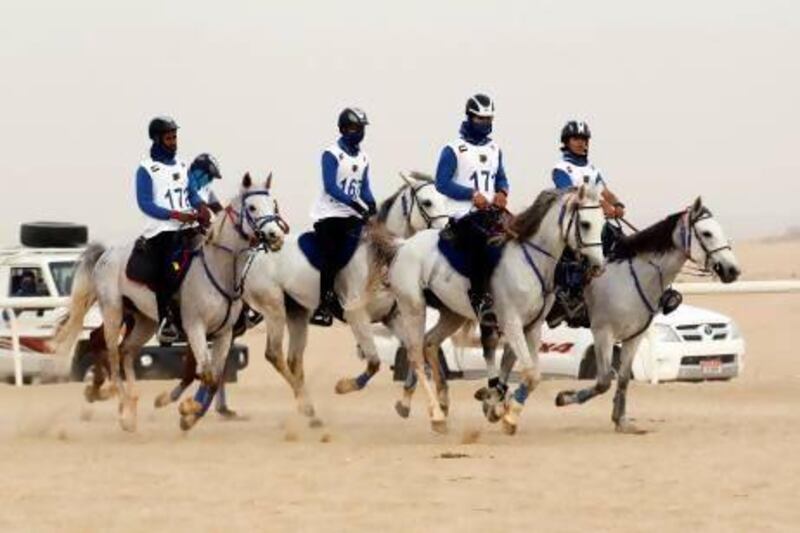The suits, the dresses and, of course, the hats already are being prepared, more than a week in advance. On Saturday, March 30, the Dubai World Cup at the Meydan Racecourse will be the epicentre for thoroughbred racing. And for good reason: the world's richest race will be run, part of the richest night of racing, and fans from around the world will be there to see and be seen.
For some racing enthusiasts, however, this weekend brings a different, more extreme but equally compelling brand of racing.
Welcome to the Dubai Crown Prince Endurance Cup.
Over the coming weekend, Dubai International Endurance City will witness two races that may not carry the glamour of the Dubai World Cup but more than make up for it as tradition-steeped tests of horse and rider.
On Friday, the Dubai Crown Prince Endurance Ride, which is restricted to privately owned stables and individual jockeys, takes place over a gruelling 100 kilometres. On Saturday, the 120km Dubai Crown Prince Endurance Cup is open to all government-funded stables, as well.
It is a chance for Arabian thoroughbreds to showcase their strength and stamina in their natural habitat. Some of the world's finest horses, mostly from Emirati stables but with a few from other countries, are expected to take part.
Speaking yesterday at Meydan Racecourse, Badr Abbas, the vice president of Commercial Operations at Emirates Airline, sponsors of the races, highlighted the link between track racing and endurance races, which tap the "roots of Arab culture".
Arabian breeds already make up the majority of successful flat-racing horses. Not surprising, they are also the most prepared to deal with the unforgiving conditions that endurance riding throws up.
Stringent regulations by the Federation Equestre Internationale (FEI), or the International Federation for Equestrian Sports, ensure that the well being of the horses comes above all other considerations.
This includes making sure that good horse management, training methods, farriery and tack, and transportation have taken place, before the horse is allowed to compete.
The races are divided into three stages, none of which are longer than 40km. At each interval, the horses are inspected to make sure they are fit to continue. Typically, a maximum heart rate of 64 beats per minute is allowed, above which a horse will be withdrawn from the competition. During the breaks, which last from 40 to 50 minutes, the horses are cooled with buckets of ice water, fed and watered.
One of the striking images of the endurance races that take place in the Dubai desert is that of scores of 4x4 vehicles accompanying the competitors, while crews pass plastic water bottles to the riders, who mostly pour the water on the horses' heads to keep them cool in the rising heat.
At the end of an endurance race, a horse is tested once again and the FEI's code of conduct calls for it to be "treated humanely when their competition careers are over".
The Dubai Crown Prince's involvement in this event extends well beyond mere patronage of the races. Sheikh Hamdan bin Mohammed has competed in endurance events; he won the 120km race in 2009.
His father, Sheikh Mohammed bin Rashid, Vice President of the UAE and Ruler of Dubai, is the reigning world endurance champion, having in August beaten 146 runners from 43 countries over 160km at the FEI World Endurance Championships in Euston Park, Thetford, in the UK.
That day, he raced his horse, Madji du Pont, for over 10 hours.
The UAE, meanwhile, has won the team gold at the last three world endurance championships, confirming the country's affinity with this more traditional form of racing.
"We have Arabian horses, from the Arabian Peninsula, and that's why the love of the horses is in our blood," Sheikh Mohammed told CNN in January. "To be around horses really gives you positive energy and positive feelings about everything."
On Friday and Saturday, the competitors will be hoping that those positive vibes drive them on to victory. Some of them, up to half the field perhaps, will probably not finish the race.
But those who do will be lavished with prizes and, perhaps far more importantly, acclaim for conquering such unforgiving terrain.
The way their forefathers did.
Follow us
[ @SprtNationalUAE ]





